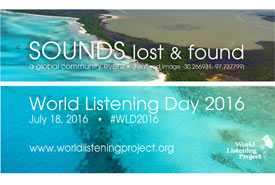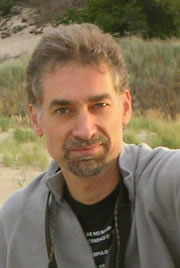World Listening Day 2016: Sounds Lost and Found

World Listening Day 2016 (Photo by World Listening Project)
Each year since 2010 the World Listening Project (WLP) has invited people around the globe to participate in World Listening Day. July 18 was selected because it is the birthday R. Murray Schafer, the renowned Canadian composer, educator and founder of the World Soundscape Project (WSP). Active in the early-to-mid 1970s at Simon Fraser University, the WSP team of researchers pioneered the new and interdisciplinary field of soundscape studies, otherwise known as acoustic ecology.
In the decades following their research and publishing, a global interest in acoustic ecology grew — in part facilitated by growing concerns with changes to the Earth's environments due to human action, and increased accessibility to technologies of sound recording. It is now clear, as the WSP had earlier shown, that environmental sounds are indicator of ecosystem health.
Each year the World Listening Project, founded in 2008 as a non-profit organization, invites individuals and organizations internationally to realize the following aims through soundwalks, concerts, radio broadcasts and Internet audio streams:
- Celebrate the listening practices of the world and the ecology of its acoustic environments;
- Raise awareness about the growing number of individual and group efforts that creatively explore acoustic ecology based on the pioneering efforts of the World Soundscape Project, World Forum for Acoustic Ecology, La Semaine du Son and Deep Listening Institute, among many others;
- Design and implement educational initiatives that explore these concepts and practices.
To make World Listening Day as inclusive and simple as possible, we offer these suggestions:
- Soundwalks or listening events in your local community, with a particular focus on natural and human evolution, human activity in nature and industry, technology and machines;
- Field recording trips or workshops;
- Site-specific performance events;
- Concerts curating compositions inspired by the theme, “Sounds Lost and Found” (contact us to connect with composers and sound artists);
- Personal experiences of attentive listening or field recording;
- Educational events that relate to acoustic ecology, field recording or a similar topic.
More suggestions are provided on the WLP's website. I encourage you to visit this and our social media platforms on Facebook, Twitter, Soundcloud, Instagram and discussion group. With a very small number of volunteers to drive the WLP, social media is a key to our success at disseminating ideas and information about our mission and World Listening Day.
In recent years we have invited leading members of the community to develop a theme for World Listening Day. For 2015, Australian sound artist and researcher Leah Barclay devised theme "H2O." Nigerian sound artist Emeka Ogboh devised the theme, "Sounds Lost and Found," echoing the concerns of his current exhibition, "Market Symphony" at the Smithsonian National Museum of African Art.
World Listening Day 2016 includes a new global virtual symposium on the "Sounds Lost and Found" theme in partnership with #SoundCon, Biosphere Soundscapes and the Midwest Society for Acoustic Ecology. On Sunday, July 17 I gave a brief keynote at 8 p.m. (U.S. Central time), following Sunday evening's Sound Treasure Hunt on The 606, a new public park in Chicago. Visit SoundCon.org to link and watch the live stream via YouTube LIVE, and for a schedule of upcoming presentations. A post-symposium video will be archived for later viewing.
It was suggested by Jeb Middlebrook, the co-organizer of #SoundCon, that we search our closets for lost media, cassettes, vinyl records, reel-to-reel tapes and compact discs; those artifacts used to record, store and distribute sounds. For many the pits and grooves in which sound is inscribed may have degraded over time, never to be heard again. In this digital or post-digital age, we may consider how the invention of perceptual coding and "lossy" compression1 schemes contribute to degraded sounds while making a so-called audio culture pervasive and widespread.
We may also consider how recorded sounds can displace human memory and the experience of sound removed from its context. Out of context, and endlessly repeatedly the recording, as a representation, changes its meaning and status for the listener. Do recorded sounds acquire a new status then, as data or commodity? What does and sound and listening mean to you? Do you hear sound in your dreams? Can you remember and recognize the unique jingle of your own house keys?
Especially, for those of us living in the Northern Hemisphere, where it is mid-summer, if the heat is not extreme, I do hope most will get out and find sounds outdoors in their urban and rural soundscapes, whether it is to record or experience unmediated listening. Consider taking a soundwalk.
Declaring a global day of observance is largely a symbolic gesture. I hope that it helps remind us of a few things. First, listening is something we do, and in doing it we continually increase our knowledge of its meaning and value. Secondly, symbolic gestures change minds and habits. One day of celebration and observance does not mean that we stop listening on the other days. I believe every day is a world listening day if we make it a new ethical habit.
1 "Lossy" and "lossless" refer to two different data compression schemes for making digital files smaller. The benefits of small file size are reduced need for disk storage space and bandwidth and increased transmission speed. However, the data lost with lossy compression is permanent. "Perceptual coding" was developed to create a close approximation to the original file or signal source as possible, while minimizing unwanted digital artifacts and visual or audible distortion. JPEG and MP3 are two common kinds of file formats that use data compression. WAV, TIFF, and AIFF are considered "uncompressed" file formats for audio and images. Lossless compression reduces a file's size with no loss of quality. Newer compression algorithms, such JPEG 2000 and Apple Lossless provide this benefit.


